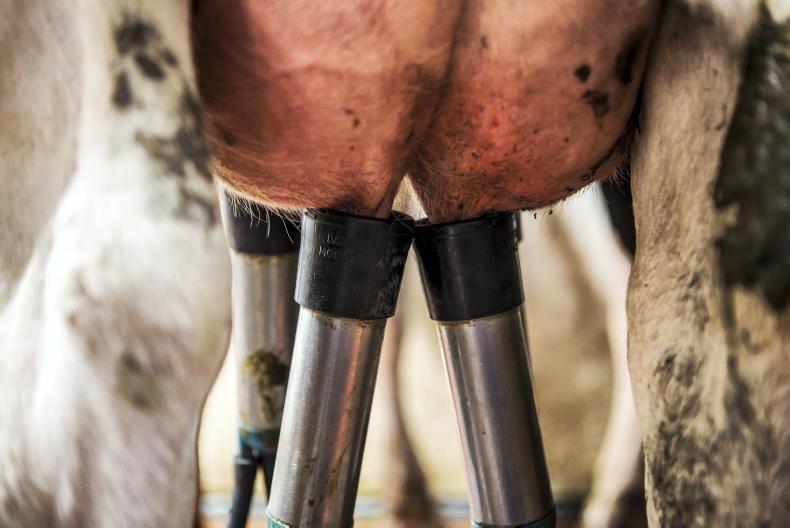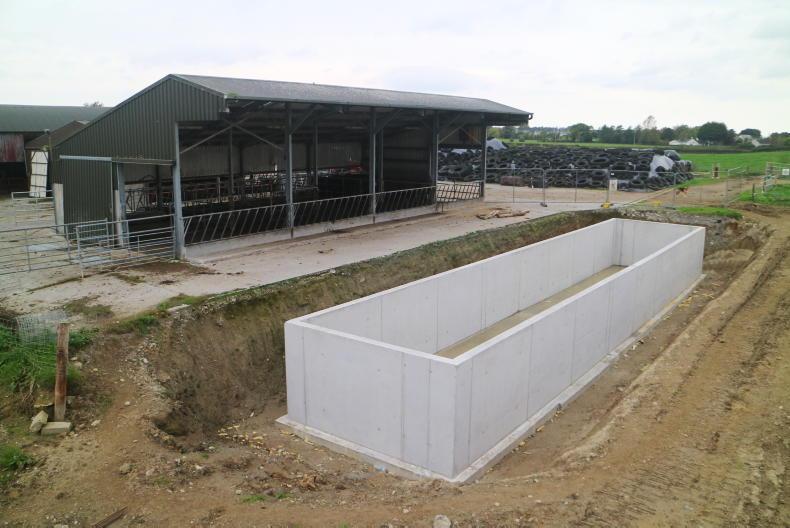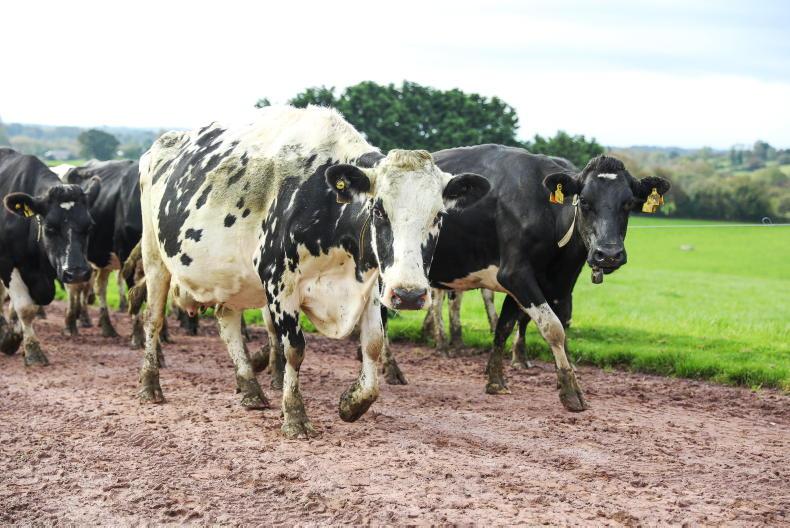The Irish Farmers' Association (IFA) has warned that losing the nitrates derogation of 220kg organic nitrogen/ha could hit the State’s legally-binding emissions reduction targets, as an area larger than the size of Co Carlow would need to enter dairy if farmers were to maintain stock numbers at 170kg N/ha.
This transfer of land into dairying would reduce land availability for low carbon diversification options set out in the climate action plan, which the IFA has cited as needing over 650,000ha of farmland between organics, anaerobic digestion, forestry and other uses.
Speaking before the Oireachtas agriculture committee on Wednesday, the association’s president Francie Gorman stated that the removal of the derogation “would result in dairy farmers requiring about 86,000ha just to maintain their current dairy cow numbers”.

Losing the derogation could inflate land prices even further, the IFA warned. / Philip Doyle
“Some mistakenly think this is only a dairy issue. In reality, any changes to the derogation impacts all land-based sectors given the hugely disruptive impact it has on the land market,” Gorman told TDs and senators.
“Drystock and tillage farmers, as well as smaller dairy farmers, are now being out-competed in the land market by larger dairy farmers, who can justify paying a higher price for land rental in order to try to maintain their business at current levels.”
Gorman claimed that every €40/ac that is added to land rental or lease costs takes €100m from “productive farmers” in a transfer to “inactive landowners whose contribution is significantly less” to rural economies.
Water quality
“It also must be considered that the expansion in the dairy herd in the past 10 years has not resulted in a proportionate decline in water quality,” the committee heard.
“In fact, at national level, water quality trends show minimal increases in nitrates, similar to what you would expect in year-to-year variation alone.”
The IFA leader called for the 70% rate of grant aid available under the Targeted Agriculture Modernisation Schemes (TAMS) for slurry storage facilities to be expanded to all farmers, not just those importing slurry who can currently avail of the higher rate.

Both the IFA and ICMSA called for an expansion of the 70% TAMS rate for all farmers constructing additional slurry storage.
Other barriers to increasing slurry storage capacity on farms remain with the granting of planning permission for tanks “getting increasingly more difficult” and with stocking rate uncertainty leaving farmers nervous of long-term investment in facilities, according to Gorman.
“Investing in slurry storage is a long-term investment. Therefore, farmers need certainty on how many dairy cows they will be milking in four years’ time if we are seeking them to make long-term investments in storage.”
ICMSA
The call for higher rates of TAMS funding to be allowed for any farmer expanding slurry storage was echoed by the Irish Creamery Milk Suppliers’ Association (ICMSA).
ICMSA president Denis Drennan stated that 20,000 extra Agri-Climate Rural Environment Scheme (ACRES) places - and with more water quality measures - are needed if nitrates pressures are to be addressed across all farms.
The ICMSA estimated that a farmer stocked at 220kg N/ha and in the highest yield band would see cow numbers cut by 43% on the numbers they carried across the same land area before banding and 2024’s derogation stocking rate cut if the derogation was to be lost entirely.
“Put very simply, 170kg N/ha would completely undermine the foundations of the Irish dairy sector, one of our largest, most progressive and sustainable indigenous sectors,” Drennan said.
The farming organisations’ concerns were relayed to the Oireachtas as the agriculture committee prepares for weeks of hearings on the subject of nitrates and the derogation.
The committee intends on compiling a report on the evidence heard to submit to the European Commission in anticipation of the kick off of negotiations between the State and Brussels to secure a post-2025 derogation.
The Irish Farmers' Association (IFA) has warned that losing the nitrates derogation of 220kg organic nitrogen/ha could hit the State’s legally-binding emissions reduction targets, as an area larger than the size of Co Carlow would need to enter dairy if farmers were to maintain stock numbers at 170kg N/ha.
This transfer of land into dairying would reduce land availability for low carbon diversification options set out in the climate action plan, which the IFA has cited as needing over 650,000ha of farmland between organics, anaerobic digestion, forestry and other uses.
Speaking before the Oireachtas agriculture committee on Wednesday, the association’s president Francie Gorman stated that the removal of the derogation “would result in dairy farmers requiring about 86,000ha just to maintain their current dairy cow numbers”.

Losing the derogation could inflate land prices even further, the IFA warned. / Philip Doyle
“Some mistakenly think this is only a dairy issue. In reality, any changes to the derogation impacts all land-based sectors given the hugely disruptive impact it has on the land market,” Gorman told TDs and senators.
“Drystock and tillage farmers, as well as smaller dairy farmers, are now being out-competed in the land market by larger dairy farmers, who can justify paying a higher price for land rental in order to try to maintain their business at current levels.”
Gorman claimed that every €40/ac that is added to land rental or lease costs takes €100m from “productive farmers” in a transfer to “inactive landowners whose contribution is significantly less” to rural economies.
Water quality
“It also must be considered that the expansion in the dairy herd in the past 10 years has not resulted in a proportionate decline in water quality,” the committee heard.
“In fact, at national level, water quality trends show minimal increases in nitrates, similar to what you would expect in year-to-year variation alone.”
The IFA leader called for the 70% rate of grant aid available under the Targeted Agriculture Modernisation Schemes (TAMS) for slurry storage facilities to be expanded to all farmers, not just those importing slurry who can currently avail of the higher rate.

Both the IFA and ICMSA called for an expansion of the 70% TAMS rate for all farmers constructing additional slurry storage.
Other barriers to increasing slurry storage capacity on farms remain with the granting of planning permission for tanks “getting increasingly more difficult” and with stocking rate uncertainty leaving farmers nervous of long-term investment in facilities, according to Gorman.
“Investing in slurry storage is a long-term investment. Therefore, farmers need certainty on how many dairy cows they will be milking in four years’ time if we are seeking them to make long-term investments in storage.”
ICMSA
The call for higher rates of TAMS funding to be allowed for any farmer expanding slurry storage was echoed by the Irish Creamery Milk Suppliers’ Association (ICMSA).
ICMSA president Denis Drennan stated that 20,000 extra Agri-Climate Rural Environment Scheme (ACRES) places - and with more water quality measures - are needed if nitrates pressures are to be addressed across all farms.
The ICMSA estimated that a farmer stocked at 220kg N/ha and in the highest yield band would see cow numbers cut by 43% on the numbers they carried across the same land area before banding and 2024’s derogation stocking rate cut if the derogation was to be lost entirely.
“Put very simply, 170kg N/ha would completely undermine the foundations of the Irish dairy sector, one of our largest, most progressive and sustainable indigenous sectors,” Drennan said.
The farming organisations’ concerns were relayed to the Oireachtas as the agriculture committee prepares for weeks of hearings on the subject of nitrates and the derogation.
The committee intends on compiling a report on the evidence heard to submit to the European Commission in anticipation of the kick off of negotiations between the State and Brussels to secure a post-2025 derogation.








 This is a subscriber-only article
This is a subscriber-only article










SHARING OPTIONS: